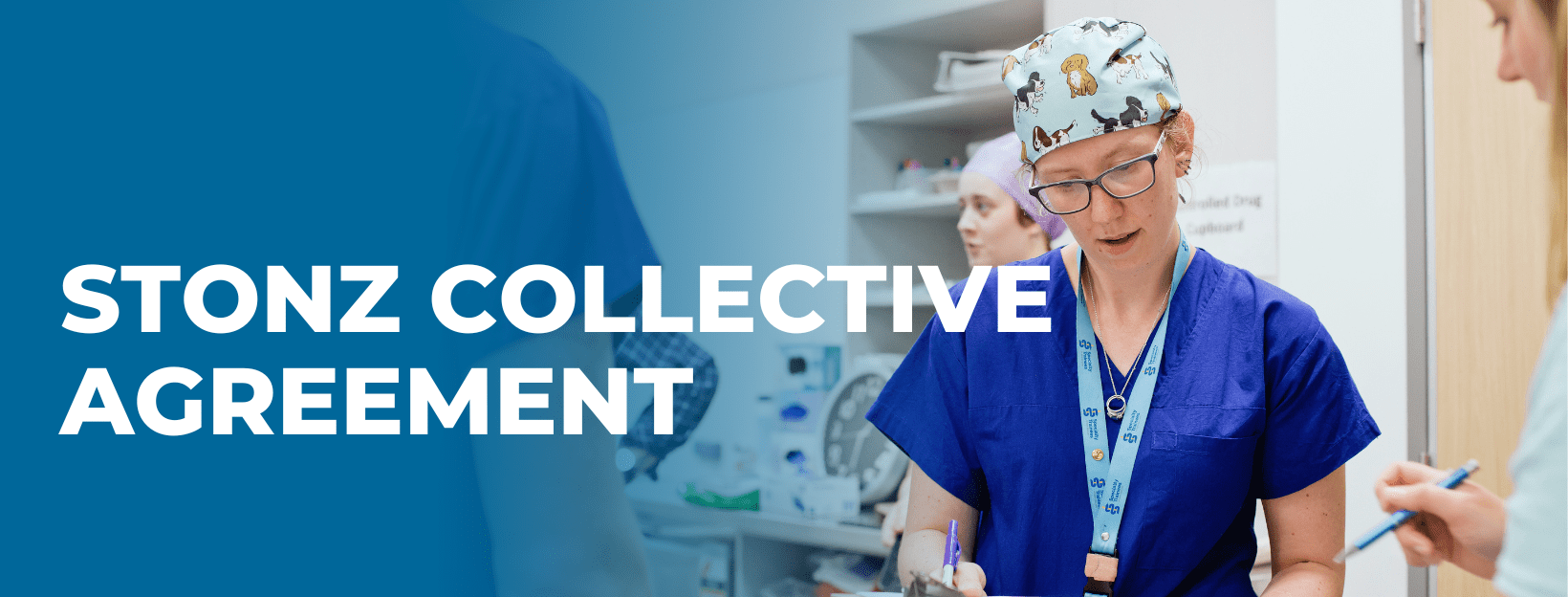The current STONZ Collective Employment Agreement (CEA) was implemented on the 14th of February 2024 following ratification by members.
This CEA will be in place from 14 February 2024 to 28 February 2026. We have created a quick view highlights and summary document for those who do not wish to read the entire new CEA as well as a FAQ document below.
In recent years we have seen restrictive working hours introduced to the New Zealand health system for RMOs.
Although these were done with the best intentions and under the guise of ‘Safer Working Hours’, they have not proven to be safe and they have resulted in some major implications for the training of many RMOs. Unfortunately, we are not the first group to tread this path; this has occurred in both the USA and the UK. In both cases to the detriment of junior doctor training. Our Collective Agreement is designed to create options for these restrictive hours and to better protect our training. We believe this ensures that all RMOs have the opportunity to train without compromise to themselves, or their patients.
If you have any questions that you can’t find the answer to here, please email the team via support@stonz.co.nz


Our Collective Employment Agreement (CEA) at a glance
Medical Education Leave
Registrars on a Vocational training programme receive 12 weeks MEL.
House Officers PGY2 or more, and Registrars not on a training programme are entitled to a maximum of 5 days per year. Plus an additional one-off three-week (15 days) MEL.
Conference Leave
Registrars in a recognised vocational programme who have passed their Part 1 exam or equivalent shall be granted a total of 10 days additional leave to attend appropriate conferences during their vocational training. There is no cap on the amount but districts will apply the actual and reasonable test.
Annual Leave
Under the STONZ collective agreement, RMOs are entitled to 6 weeks Annual Leave each year.
Sick Leave
If you transfer union membership to STONZ you can transfer your entire sick leave balance. As a member of STONZ, the collective agreement allows for up to 10 days of Sick Leave per year plus an additional 10 days of discretionary sick leave. The first 5 days of discretionary leave are to be approved in the same way normal sick leave is approved.
As Te Whatu Ora is one organisation all sick leave should be transferred when changing districts.
Parental Leave
If you are the primary caregiver and have been employed by Te Whatu Ora for more than 12 months you are entitled to take up to 52 weeks leave. If you have been employed for less than 12 months you can apply up to 6 months' leave.
As the Primary Caregiver you are able to apply for 14 weeks of paid parental leave (the district will pay the difference between the weekly statutory payment and the equivalent weekly value of your base salary.)
As the non-primary caregiver, you are entitled to up to 2 weeks paid leave on your ordinary salary, this is in addition to the 2 weeks unpaid partner leave available under the Act.
For more information see our Parental Leave page and the Best Practice Parental Leave Guidelines in Appendix 6 of the STONZ Collective Agreement.
Registrar Implements to Aid Training (Clause 10.8.2)
This fund is available to all Registrars. This fund of $2000 (before tax) and is accruable up to $6000 is available for each full year of service.
The CME fund has a common anniversary date of the 1st of February each year. If you use this fund to pay for something other than IT equipment and it was purchased in NZ, the district will pay GST. (Note: The common anniversary date will change to 1 February to align with the RMO year from the 2024/2025 year.)
If you purchase IT equipment, the government classifies this as income, and the reimbursement for this will be subject to PAYE tax.
There is a 6-month limit to claim items after the date of purchase. Note, that if you buy something before becoming eligible it will not be reimbursed. This fund can also be used to attend conferences, interview preparation courses, or professional coaching. If you are unsure if an item will be covered please get in touch.
Extra Training Support for House Officers (Clause 10.9)
House Officers can now access an additional $500 to aid training. Eligibility is that an RMO must have completed 12 months of service. This grant is to assist with acceptance into a New Zealand or Australasian Training Programme.
Accessing this fund should be discussed with the relevant educational supervisor or Senior Medical Officer with an understanding of the entry requirements of the particular vocational programme, and should be part of a House Officer’s documented career plan.
This grant can be claimed for two years ($1000) and can be transferred between districts. It cannot be used to reimburse the purchase of IT equipment or medical/surgical equipment.
Employment related expenses
As a permanently employed RMO you are entitled to have your APC, ACLS, Indemnity Insurance, your In-practice or Australasian colleges fee’s reimbursed. Membership of Te Ohu Rata o Aotearoa is also reimbursed up to $300 per annum.
Under the STONZ Collective Agreement, RMOs (PGY2+) not on a training programme will be entitled to the costs pertaining to attending approved courses and events that facilitate their acceptance onto a vocational training programme, subject to support from the appropriate clinical lead and based on the pre-requisites set by the colleges. RMOs on a training program are entitled to actual and reasonable training expenses associated with college requirements.
Reimbursements of training and employment related expenses should be reimbursed within 4-6 weeks as per the STONZ collective agreement.
Rosters
Our rostering guidelines are evidence-based and founded on the guidelines for the Royal Australasian College of Surgeons and the Australian Medical Association. Our guidelines give significant flexibility at a local level.
Limits on hours are 72 hours for a week and 140 for 14 days (if both of these limits are breached, both penalty payments can be claimed).
A maximum of 12 days can be worked in a row (after which you require a 48-hour break).
Most rosters will have split night shifts of 3 and 4 nights. Up to 7-night shifts can be rostered but only with RMO agreement and only if there is regular opportunity for rest (more details on rostering 7 nights can be found in Appendix 4 of the collective agreement).
STONZ Rosters can be changed unless there is a disagreement by 1/3 of the RMO’s working the roster (previously you required 2/3 agreement to change).
If a RMO Roster is published with less than the 28 days’ notice required under 4.3, all RMOs working that roster will receive a penalty payment of $75 for every full or part day that the roster is late (excludes Relivers and Rosters that are substantially undertaken by an RMO in the service).

The true cost of restrictive working hours
Rostered week days off following weekend work leads to complicated handovers, dilution of training and loss of team structure.
Dilution of training has a detrimental effect on the quality of training and length of time required to complete training
Increasingly complex and frequent handovers putting patients at risk and costing the hospitals time and money
The loss of team structure and team dynamics, a cornerstone of medical and surgical training
Hour restrictions increase the demand for relief role RMOs which can be dissatisfying for RMOs and dangerous for patients.
Finding the right balance
“Safer” working hours need to be proven to be safe for both patients and those working the rosters.
Our members have told us is that it takes 3-6 months to find your feet as a new RMO. We recognise that there are different needs at different stages of training so, to help the transition to House Officer and better support our new RMOs our Collective states new PGY1s will work 10/4 rosters for their first 2 quarters.
At STONZ we agree RMOs don’t have the best work-life balance and our commitment is to continue to work with our employers to improve working conditions overall for our members as well as continuing to work towards creating rosters that are collaborative, adaptive and safe for both doctor and patient.

Roster Review & Improvement Framework
To help combat some of these challenges our team worked to develop a Roster Review tool. The RMO Roster & Relief Review and Improvement Frameworks have successfully supported Te Whatu Ora | Health New Zealand and RMOs to work collaboratively to review rosters and identify solutions that can be implemented at a local level. Due to the positive outcomes seen with the utilisation of this framework to date, services are strongly encouraged to continue use of the frameworks if concerns with rosters/relief models are raised or where change is considered.
You can find the Roster Review Tool HERE in the STONZ National Manual and the RMO Roster Relief Review and Improvement Frameworks HERE.
Office Hours
Our normal office hours are 9am - 4.30pm, Monday to Friday.
If we don't answer straight away please leave a message and we will return your call ASAP.
Contact us
Please get in touch with any questions you may have. We would love to hear from you.
E: support@stonz.co.nz
P: 03 745 9258
PO Box 22656, Christchurch 8140
HOME | ABOUT STONZ | WHO WE ARE | SECA | TRAINEE INTERNS | RESOURCES | JOIN STONZ | Join us on Facebook








